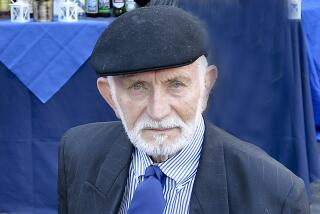Brian Maxwell, 51; Marathoner Was a Co-Creator of PowerBar
- Share via
Brian Maxwell, a former world-ranked marathoner who pioneered the energy bar business in the mid-1980s as a co-creator of PowerBars, has died. He was 51.
Maxwell collapsed Friday morning in front of the post office in the Marin County city of San Anselmo after an apparent heart attack. He was taken to Marin General Hospital, where he was pronounced dead.
Born in London, Maxwell grew up in Toronto, then went to UC Berkeley. He graduated with a degree in architecture and received the Bruno Hamilton Award as the outstanding student athlete on the track team. In 1977, he was ranked the No. 3 marathoner in the world by Track & Field News.
As the 1980 Olympics in Moscow approached, Maxwell was the No. 1 marathoner for the Canadian Olympic team. But Canada joined the U.S.-led Olympic boycott to protest the Soviet invasion of Afghanistan, and Maxwell never competed in the Olympics.
He coached runners at Berkeley and continued to compete in marathons. According to an obituary Saturday in the Marin Independent Journal, his best time at his peak was believed to be 2 hours, 15 minutes at a race in Oregon.
But during a 1983 race, Maxwell experienced stomach problems that led to a disappointing finish. He came away from the event believing that he needed a quick energy supply during a competition. He began experimenting with ideas for a low-fat energy food that could be consumed before or even during an event.
Working in the kitchen of his Berkeley apartment, Maxwell -- along with Bill Vaughn, a biochemist from the university, and Jennifer, a food science student who would later become his wife -- developed the bar over a three-year period.
“The early batches had problems, especially with texture and shelf life,” Maxwell told an interviewer some years ago. “Some would come out of the pot with wonderful taste and texture, but a week later they were bricks.”
They refined the process, however, and by 1986 had created a marketable product.
The first two flavors were chocolate and malt nut, and the ingredients included oat bran, brown rice, fruit juice concentrate and a complex carbohydrate from corn.
Their initial plan was merely to market the idea to a large food manufacturer.
“We wrote letters to all the major food companies, and if we did get a response, it was a form letter,” Maxwell once told a Canadian newspaper. “We realized that nobody was going to pay us a royalty in a market that didn’t exist. So we decided to create the market.”
They launched the company, with Maxwell as president, using $55,000 from his life savings and some money from his parents. Working on slim capital, they had no funds for advertising and just enough for an initial run of 35,000 PowerBars.
“For us, marketing meant standing in the rain at 5 in the morning at races and handing out PowerBars with coupons that told people how they could order them,” Maxwell told Success magazine.
They started a mail-order business, and within three years sporting goods stores and health clubs across the country were stocking the snack. Their Berkeley kitchen operation eventually expanded to two plants.
Over the next 13 years, PowerBar Inc. grew to $150 million in sales with 300 employees. It also spawned a rash of competitors, including Balance Bars and Clif Bars.
The competition became heated, and when Kraft foods bought Carpinteria-based Balance Bars in early 2000, the Maxwells decided to sell. Four years ago this month, Nestle SA bought PowerBar Inc. for a reported $375 million.
Over the years, Maxwell was named Entrepreneur of the Year by Inc. magazine and one of the 100 Superstars of Marketing by Advertising Age.
He and his wife were benefactors of their alma mater, UC Berkeley, funding programs for the athletic department as well as endowing a chair for the department of public health.
Maxwell, who lived in the Marin County city of Ross, is survived by his wife and five children.
More to Read
Go beyond the scoreboard
Get the latest on L.A.'s teams in the daily Sports Report newsletter.
You may occasionally receive promotional content from the Los Angeles Times.










